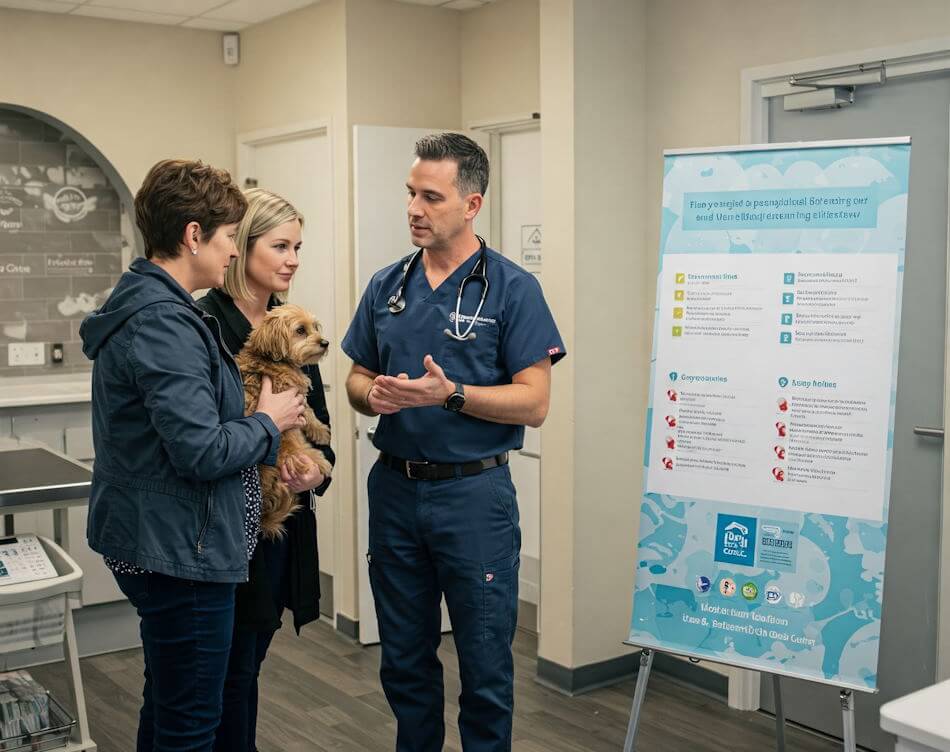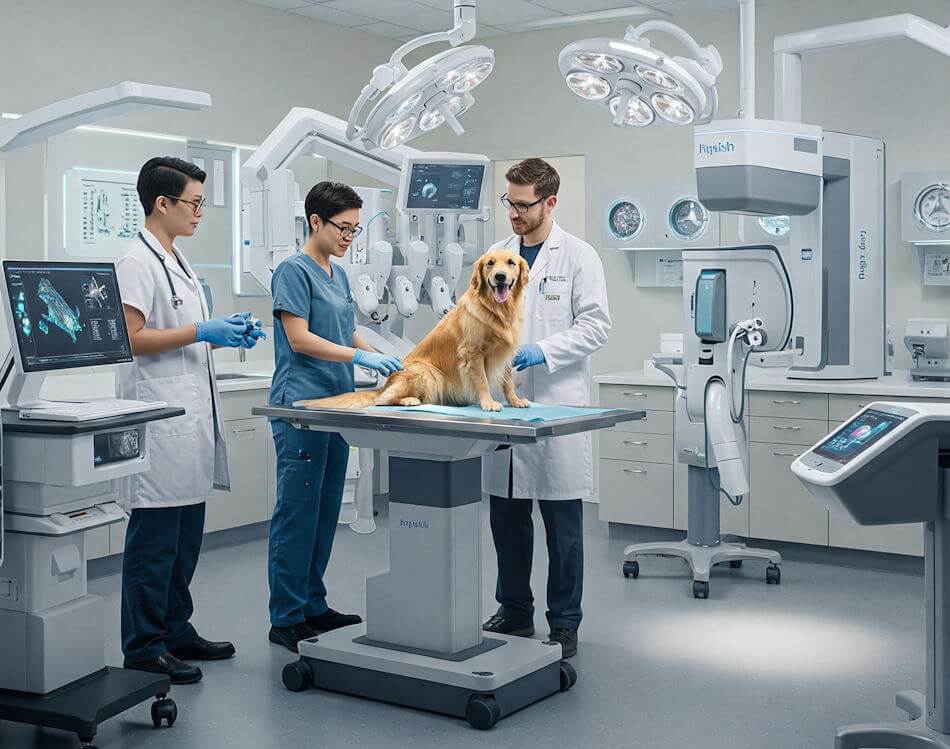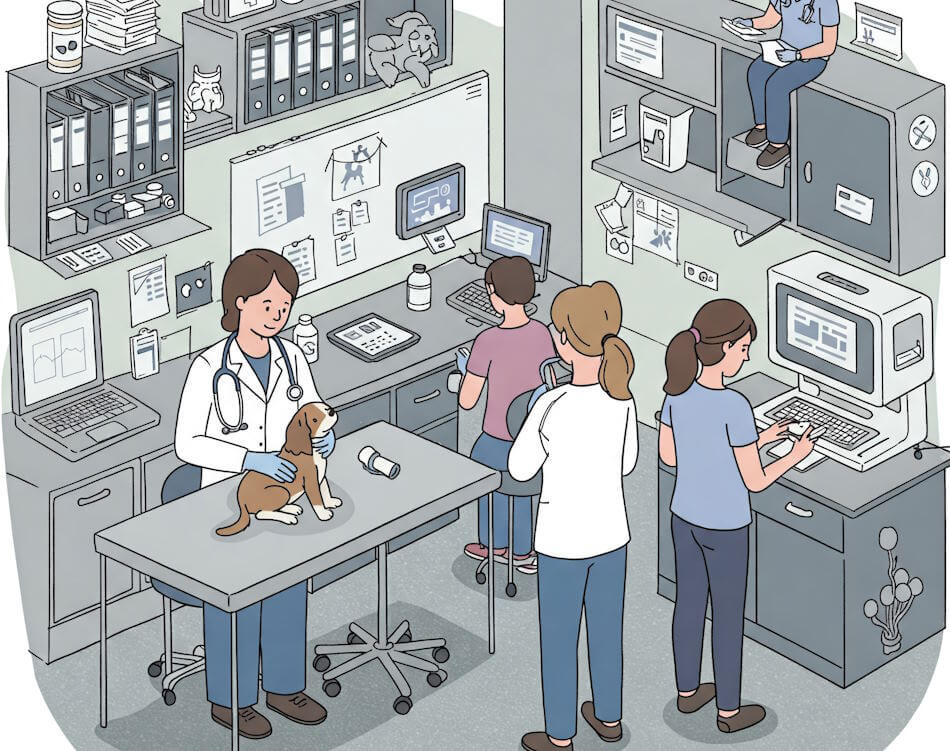Veterinary ethics is a crucial aspect of the veterinary profession, focusing on the moral principles that guide the treatment and care of animals. It encompasses a broad range of considerations, including animal welfare, client relationships, and community responsibility. As veterinary professionals, practitioners are not only tasked with diagnosing and treating animals but also with making complex ethical decisions that can have significant implications for the pets they care for, their clients, and society at large.
One of the primary reasons veterinary ethics is important lies in the inherent vulnerability of animals. Unlike humans, animals cannot vocalize their needs or express pain in ways that are easily understood by their caregivers. This reliance places a significant ethical responsibility on veterinary business owners and their teams to advocate for animal welfare, ensuring that all decisions prioritize the health and wellbeing of their patients. The ethical principles such as beneficence, non-maleficence, and justice serve as a framework to guide practitioners in these often challenging situations.
Moreover, veterinary ethics extends beyond animal welfare. It includes obligations to clients who trust veterinary professionals with the care of their pets. This relationship must be grounded in trust, honesty, and transparency. Ethical dilemmas can arise from conflicts of interest, financial considerations, or differing opinions regarding treatment options. Veterinary business owners must navigate these challenges while maintaining professional integrity and a commitment to providing optimal care.
Lastly, veterinarians hold a position of influence within their communities. They are often seen as advocates for not just animal health, but also public health and disease prevention. This societal role creates additional ethical obligations, such as promoting responsible pet ownership and addressing issues like overpopulation and zoonotic diseases. Understanding the multifaceted nature of veterinary ethics is essential for business owners as they work to align their practice with these vital moral standards.
Understanding Animal Welfare
Animal welfare is a fundamental concept that should underpin the practices of all veterinary business owners. It encompasses the physical, emotional, and psychological well-being of animals, and highlights the moral obligation that veterinarians have to ensure the best possible care for their animal patients. This holistic approach requires veterinary professionals to prioritize not only the treatment of physical ailments but also the emotional needs of animals during their time in a veterinary setting.
The significance of animal welfare extends beyond individual clinical interactions; it reflects broader societal values and expectations concerning the humane treatment of animals. Veterinary business owners should be guided by established principles, such as the Five Freedoms, which advocate for the following: freedom from hunger and thirst, freedom from discomfort, freedom from pain, injury, or disease, freedom to express normal behavior, and freedom from fear and distress. By integrating these principles into their practices, veterinary professionals can ensure a higher standard of care that promotes both the physical health and emotional happiness of animals.
Moreover, effective communication between veterinary staff and pet owners plays a critical role in fostering an environment that prioritizes animal welfare. Educating pet owners about the signs of stress or discomfort in their pets, as well as the importance of regular veterinary visits, forms a collaborative partnership aimed at enhancing animal well-being. This collaboration ultimately fosters trust, enabling veterinary business owners to advocate not only for the pets in their care but also for significant changes in the attitudes toward animal welfare within the community.
In sum, the veterinary profession holds a vital role in safeguarding animal welfare. By embracing a comprehensive understanding of animal care that prioritizes both emotional and physical health, veterinary business owners can contribute positively to the lives of animals and educate society about the importance of humane treatment and welfare standards.
Client Communication and Transparency
Effective client communication is a cornerstone of ethical veterinary practice. As veterinary business owners, it is imperative to foster open dialogues with clients about their pets’ health conditions and the care options available. Transparency in communications not only builds trust but also empowers pet owners to make informed decisions regarding their animal’s health and well-being.
When discussing diagnosis and treatment plans, veterinary professionals have the ethical responsibility to provide comprehensive and truthful information. This includes an honest appraisal of the pet’s condition, the various treatment options available, their associated costs, and potential outcomes for each choice. Clients should feel comfortable asking questions, and veterinary staff should be prepared to address any inquiries thoroughly and compassionately.
The conversation regarding treatment options should not be a one-sided discourse. Actively engaging clients in discussions about the implications and potential risks of each treatment choice fosters a sense of partnership in the caregiving process. By clearly explaining the reasoning behind recommendations, veterinary business owners can ensure that clients understand why certain actions are necessary. Furthermore, this approach can alleviate apprehensions clients may have about the suggested treatments.
Additionally, discussing costs upfront is critical. Veterinary services can often be costly, and being transparent about pricing can help clients budget for necessary treatments. It is essential to communicate any additional charges that may arise during the treatment process, allowing clients to make decisions consistent with their financial capabilities. By promoting open lines of communication regarding treatment and costs, veterinary business owners uphold their ethical obligation to support their clients in making informed decisions about their pet’s care.
Financial Ethics in Veterinary Practice
The financial responsibilities of veterinary business owners extend far beyond traditional accounting practices; they encompass ethical billing methods, transparent pricing strategies, and sensitivity towards clients’ financial situations. Maintaining financial ethics in veterinary practice is crucial in fostering trust and integrity in the relationship between veterinarians and pet owners. Ethical billing practices involve ensuring that all services rendered are appropriately documented and that the charges reflect the actual services provided. This establishes credibility and discourages any suspicion of overcharging or unnecessary procedures.
Honest pricing strategies play a significant role in the ethical landscape of veterinary practices. It is important for veterinary business owners to provide clear and upfront estimates for services, including any possible additional costs. By doing so, they create a climate of transparency that encourages clients to seek veterinary care without fear of unexpected expenses. Such honesty not only reaffirms the veterinarian’s commitment to fair business practices but also enhances the overall client experience, leading to increased loyalty and repeat visits.
Financial sensitivity within the context of veterinary practice also involves understanding and addressing clients’ diverse financial situations. Many pet owners may face financial constraints that limit their ability to pursue necessary treatments for their animals. Veterinary business owners should strive to offer flexible payment options or work with clients to prioritize care that aligns with their budget. Discussing available alternatives, such as low-cost clinics or financial assistance programs, can demonstrate a commitment to both the animals’ welfare and the clients’ financial constraints. Ultimately, an ethical approach to financial responsibilities not only supports the practice’s sustainability but also fosters a compassionate atmosphere in which pets receive the care they deserve. In conclusion, financial ethics are integral to the veterinary profession, ensuring that both the pets and their owners are treated fairly and with respect.
Staff Welfare and Professional Development
The ethical responsibilities of veterinary business owners extend significantly to their employees, as fostering a healthy, supportive work environment is paramount. A veterinary practice relies on the dedication and expertise of its staff, making it crucial for owners to prioritize the well-being of their workforce. This encompasses not only mental and physical health but also creating an atmosphere where employees feel valued and supported. Ensuring that veterinary technicians, assistants, and administrative staff can share their concerns openly contributes to a more cohesive and motivated team.
Additionally, professional development opportunities can be approached as an ethical obligation rather than just a business strategy. Business owners should implement regular training sessions, workshops, and conferences that enhance the skills and knowledge of their staff. These initiatives not only elevate the standards of care provided to clients and animals but also demonstrate a commitment to the personal growth of employees. By investing in their team members’ education and advancement, veterinary business owners contribute to higher job satisfaction and lower turnover rates, thereby reinforcing a positive organizational culture.
Fair labor practices are equally significant in meeting ethical standards within a veterinary practice. Veterinary business owners must ensure that their employees receive fair compensation, benefits, and reasonable work hours. Compliance with labor laws is essential, and creating transparent policies can help safeguard against unfair treatment. Ethical leadership in this regard establishes trust and respect between management and staff, ultimately leading to improved morale and productivity.
In summary, the ethical obligations of veterinary business owners towards their employees encompass ensuring their welfare and providing professional development opportunities alongside equitable labor practices. These initiatives are vital for fostering a productive and motivated team, ultimately enhancing the overall effectiveness of the veterinary business.
Client Privacy and Confidentiality
Client privacy and confidentiality are of paramount importance in the veterinary profession. Veterinary business owners have a significant ethical responsibility to ensure that client information is securely protected and that privacy is maintained. As veterinarians handle sensitive client data—from personal contact details to detailed health records of pets—it is essential to uphold strict confidentiality protocols.
Understanding legal obligations is critical. Laws, such as the Health Insurance Portability and Accountability Act (HIPAA) in the United States, dictate how personal health information must be handled and safeguarded. Veterinary business owners must stay up-to-date with these regulations to ensure compliance and protect client interests. Furthermore, many veterinary organizations outline ethical standards advocating for the confidentiality of client information, emphasizing the duty to safeguard an owner’s trust as a fundamental aspect of professional ethics.
The risk of data breaches poses significant consequences, not only for clients but also for veterinary businesses. A breach of client confidentiality can lead to financial losses, damage to reputation, and loss of trust among clients. In some cases, failing to maintain client privacy can even lead to legal repercussions, resulting in lawsuits and penalties that jeopardize the veterinary practice’s future. Therefore, investing in robust data security measures, such as secure databases, encrypted communications, and proper employee training, is essential to mitigate such risks.
Ultimately, veterinary business owners must prioritize client confidentiality to foster trust within the client-veterinarian relationship. By implementing sound policies and practices, they can ensure that sensitive information remains protected and that they adhere to legal obligations while demonstrating their commitment to ethical conduct in their practice.
Addressing Ethical Dilemmas in Practice
Veterinary business owners frequently encounter a range of ethical dilemmas that can challenge their judgment and affect their relationships with clients and animals. One of the most poignant issues is the decision surrounding euthanasia. Balancing the quality of life for an animal against the emotional distress of the owner can create a difficult situation. Veterinary professionals often find themselves in the position of guiding clients through these heart-wrenching decisions, requiring not only clinical insight but also compassion and understanding. It is essential to have comprehensive communication strategies in place to support clients, ensuring they are well-informed of their options and the implications of each decision.
Another significant ethical dilemma arises from the practice of over-treatment, which may occur when there is a financial strain on clients. This situation poses the risk of either pushing for more aggressive treatments that may not align with the best interests of the animal or inadvertently depriving the patient of necessary care due to cost constraints. Veterinary business owners must assess each case individually, taking into consideration the animal’s wellbeing while being compassionate towards the owner’s financial situation. Offering a range of treatment options and allowing clients to make informed choices can mitigate this issue, striking a balance between ethical responsibilities and the economic realities of their clients.
Conflicts of interest can also emerge in the veterinary field, especially when forming relationships with pharmaceutical or product suppliers. Maintaining transparency and prioritizing the health of the animals over potential financial gains is critical. Establishing clear guidelines regarding referrals and partnerships will help ensure that the focus remains on providing ethical care. Ultimately, navigating these complex ethical dilemmas requires both analytical skills and emotional intelligence, as veterinary business owners strive to uphold their moral duties while promoting the health and welfare of their animal patients.
Community Engagement and Social Responsibility
Veterinary business owners play a crucial role in their communities, not only by providing essential healthcare services to animals but also through active engagement in community welfare and improvement. The ethical responsibilities of these practitioners extend beyond the confines of their clinics, encompassing a commitment to public health and animal welfare at a local level. By embracing a proactive approach, veterinary professionals can have a significant impact on their communities, fostering a culture of care and responsibility.
One common way veterinary business owners can contribute to their communities is through pro bono work. This may include offering free or discounted services to low-income pet owners or providing veterinary care for stray and abandoned animals. Such initiatives not only alleviate the financial burden on pet owners but also ensure that vulnerable populations of animals receive the necessary medical attention, ultimately benefiting overall community health. Engaging in these altruistic endeavors enhances the reputation of the veterinary profession and underscores the importance of compassion within animal care.
Furthermore, veterinary business owners can take the lead in organizing or participating in community outreach programs aimed at educating the public about responsible pet ownership, nutrition, and preventive healthcare practices. By providing workshops or seminars, these professionals can empower pet owners, thus reducing the incidence of preventable diseases in animals and promoting the overall well-being of both pets and their human counterparts.
Additionally, veterinary practices may collaborate with local shelters, animal rescues, or advocacy groups to support initiatives that promote animal welfare. Whether through sponsorships, volunteer efforts, or joint fundraising activities, these partnerships can significantly enhance the impact of community programs. Ultimately, the active involvement of veterinary business owners in these initiatives not only exemplifies their social responsibility but also solidifies their commitment to fostering healthier communities.
Conclusion: Embracing Ethical Practices
In the dynamic field of veterinary medicine, the ethical responsibilities of business owners are paramount. Throughout this discussion, we have addressed several key areas where veterinarians must uphold high ethical standards, such as animal welfare, client relations, and community engagement. Business owners must prioritize the health and well-being of animals while ensuring that their services are accessible and meet the diverse needs of their clients.
Moreover, transparency and honesty play a crucial role in fostering trust within the veterinarian-client relationship. Veterinary business owners should cultivate an environment where clients feel comfortable discussing their pets’ needs, as well as any financial concerns. This demand for clear communication is not merely a best practice but an ethical imperative that can lead to better decision-making for both pet owners and professionals.
Another significant aspect of ethical responsibility lies in the continuous education and professional development of veterinary staff. Business owners are tasked with providing their team members with opportunities to expand their knowledge and skills, which ultimately translates into improved care for animals. Ethical leadership promotes a culture of lifelong learning within the practice and encourages the entire team to stay informed about advances in veterinary science and humane practices.
Additionally, veterinary business owners have a unique opportunity to advocate for broader community ethics. They can engage in outreach programs that emphasize responsible pet ownership, promote spaying and neutering, and educate the public on animal care and welfare. By taking a proactive stance on ethical issues, business owners can shape a more compassionate culture within the veterinary profession and inspire others to follow suit.
In summary, embracing ethical practices is essential for veterinary business owners. By adhering to their responsibilities, they not only enhance the welfare of animals and the service provided to clients but also set a standard for ethical leadership that positively impacts the entire veterinary community.





